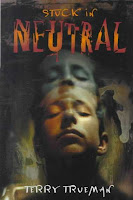
Ms. Hayes' freshman English classes have been reading Stuck in Neutral, by Terry Trueman, so I decided to read it, too -- it's been on my "to-read list" for quite a while. It was a fast read, and a real page turner. Shawn is a 14-year-old boy who has cerebral palsy, and therefore has no control over his muscles. We the readers are able to hear his thoughts, and he sounds like any other kid his age, though he is very honest about his abilities and disabilities, his desires and wishes, and his relationships or lack thereof. Shawn can't speak, feed himself, control his bowels, stand, or let anyone know his thoughts. His parents have been divorced for years. Shawn, his brother, and sister live with their mom, and Dad is not too far away. He had written a Pulitzer-Prize winning poem about Shawn years ago that won him a lot of acclaim, and now he is appearing on TV to suggest that too much money is spent to "educate the uneducable" -- and he features an imprisoned man found guilty of murder after he killed his brain-damaged 2-year-old son. Shawn comes to suspect that his father plans to kill HIM, too. And if that IS his dad's intention, Shawn knows he can't do anything to stop it.
This was an enlightening book which made me really think. I found it especially moving that the author has a son much like Shawn - and he must have wondered whether his son has deep thoughts, whether he knows things and is aware of his world as Shawn is. That thought is both sad and hopeful. I highly recommend this book -- and can't wait to read its partner-book, Cruise Control, told from the point of view of Shawn's brother Paul.







